See DemandJump in Action
By embracing DemandJump's approach to SEO, we have been able to increase our organic rankings within just 2 weeks of implementing recommendations. This helped us see a 22% increase in organic search month-over-month.
Robert Jacko Vice President Digital Marketing @ Homage
DemandJump has become a crucial extension of our marketing team, providing game changing insights to fuel and propel all aspects of our digital marketing efforts. The DemandJump platform is a must have, we are seriously impressed.
Tim Lavinder Director of Ecommerce @ Hotsox
We used to spend hours looking for insights in dozens of tools and reports. Now we log into one place to find out what customers are doing and how to meet them where it matters most.
Zach Roop Digital Marketing Manager @ Dometic
We use DemandJump recommendations as our digital to-do list. We love going in and seeing the recommendations and knowing what to do next.
JoLynda Wilson Marketing Director @ IWC
Trusted by Brands Around the World
DemandJump Product Suite
Eliminate wasted time and spend. With DemandJump's content, insights, and attribution
you will know with certainty how to win by aligning your marketing to actual consumer behavior.
Content
DemandJump assembles the world’s data, creates networks of customer touchpoints around any topic or keyword, and tells you exactly what content to write, keywords to include, videos to produce, and much more.
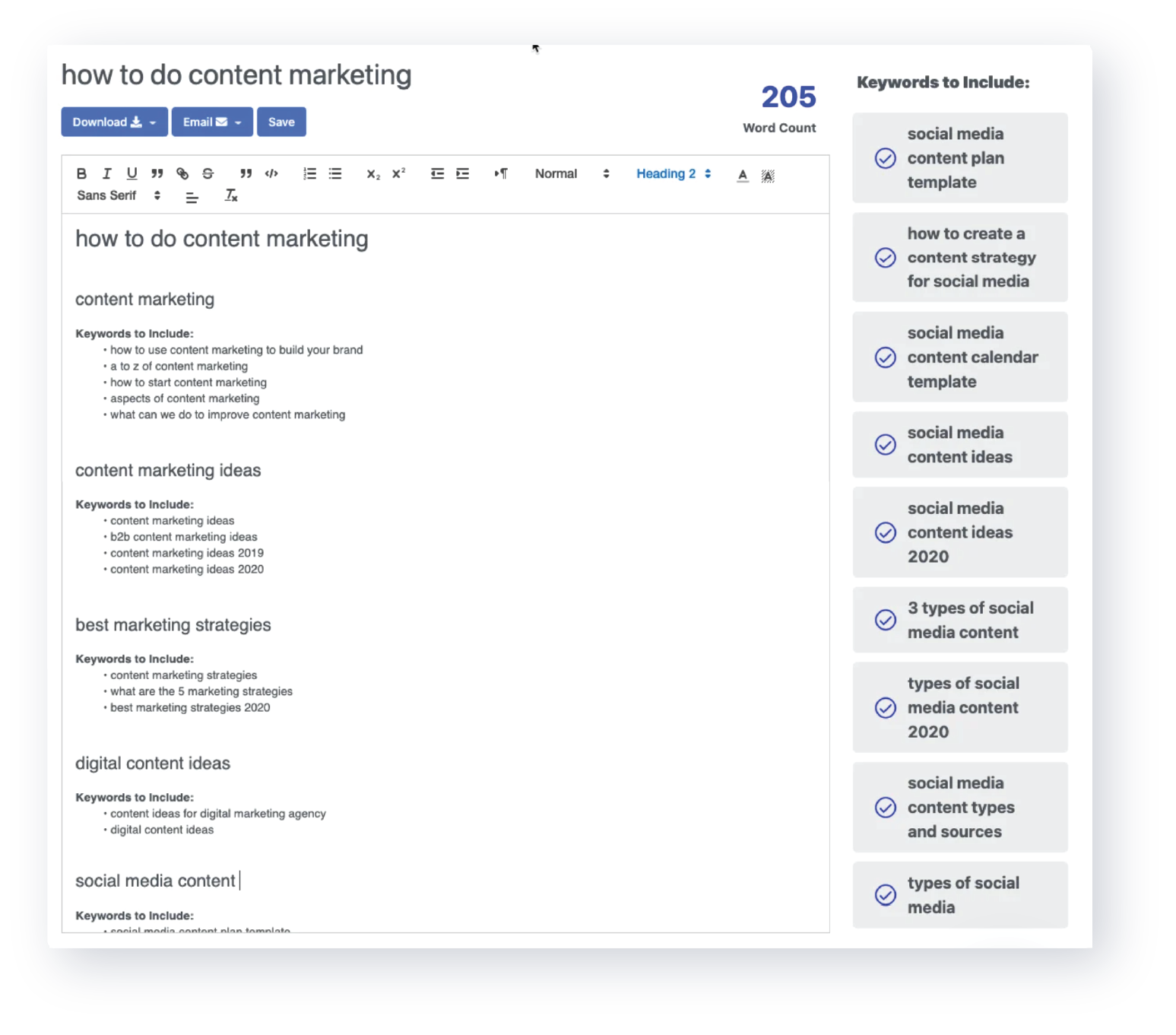
Insights
Find out what your target audience cares about for any category, product, or topic, with the click of a button. Gain market share by aligning your marketing efforts to actual customer behavior.
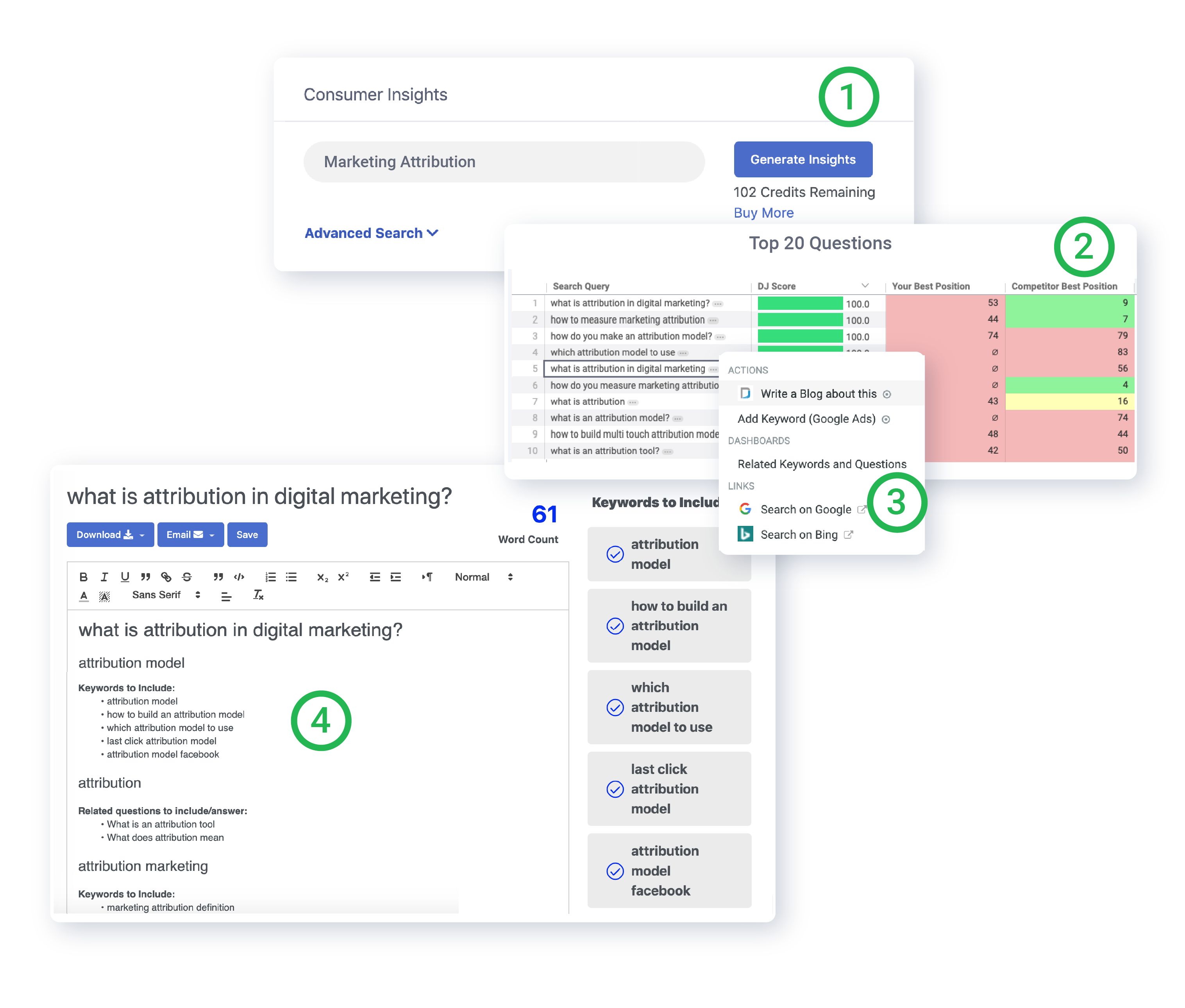
Attribution
Eliminate wasted time and spend. With DemandJump's automated account-based attribution solution you will know with certainty which efforts are driving ROI.
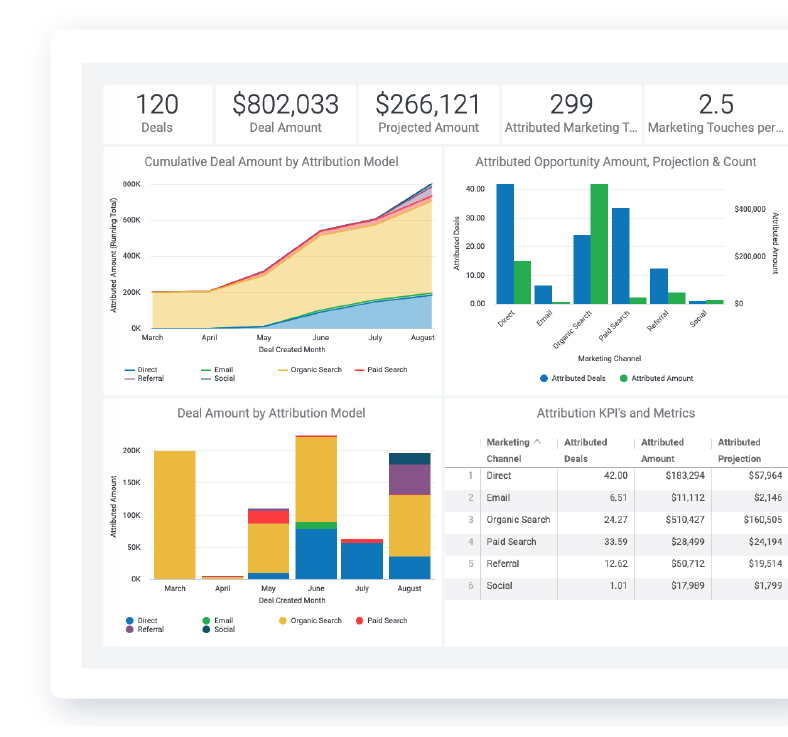
See a Demo of DemandJump
It's no secret: marketing analysts and others who are able to crunch big data are in high demand for today's marketing departments. Data-driven marketing is one of the most exciting adventures for marketers in this new decade, with petabytes of information available based on customer interactions with your brand on the web, across social media, and in person. With the advantages provided by a thorough understanding of the available marketing analytics, marketers are able to discern what types of activities are resonating with their audience -- and which are simply falling flat. Without this insight into prospect and customer behavior, marketers could easily be overspending on strategies that aren't providing the desired business results.

What becomes even more challenging is when marketers attempt to determine which particular efforts are driving success -- or even what success looks like for their organization. Is success measured in the number of sales that occur? Perhaps the most important scale is social media followers or engagements? Still other companies are looking for ways to drive visits to their website. It's important to note that there are no right or wrong answers and that the same marketing team may be defining variable success metrics for each marketing campaign or brand under their control. With the expansive reach of digital analytics and the ongoing difficulties of tying marketing analytics to business results, it is not surprising that there is a great deal of confusion around the analytical topics associated with modern marketing activities.
Importance of Marketing Analytics
Are you 100% confident that you understand every single activity that's happening in your marketing world? If not, then you need marketing data to help you make good decisions about your advertising and marketing spend. With dozens of avenues to promote your product, there are probably only a few that will truly add value to your brand. With that limited scope, it's vital that you are able to select the correct options -- or you risk spending the vast majority of your budget on tactics that simply are not delivering the ROI that you need and deserve. Using big data in marketing can be a major challenge, particularly if you don't have a marketing data analyst available to continually crunch the numbers.
When you utilize marketing analytics to track campaign activities, you are able to pull together marketing analytics, web analytics, and business analytics to create a cohesive view of your marketing activity and results. The data that you capture and analyze could come from a broad spectrum of activities -- everything from social media shares and engagements to website visits and phone calls generated by particular campaigns. When you have a firm grasp of your web marketing analytics, you are even able to track specific campaigns and determine whether they are driving eCommerce sales, too. Where marketing teams of all sizes struggle is in attempting to determine which marketing metrics are providing the useful insight that you need to make good decisions about your budgets.
Digital Marketing Analytics Techniques
Getting the most out of your investment in digital marketing efforts requires a firm understanding of marketing data analysis: how it is performed, data tolerances, pulling together disparate data sources and more. Advanced solutions that include predictive analytics tools are also being incorporated into web analytics software, helping marketers understand and predict what that all-important "next-best-action" will be for specific guests. While this type of analytics is still evolving, it is being actively used by enterprise organizations but also included in data analytics software on a more limited scale. The reason that this type of prediction is still in its infancy is that there are a plethora of data points and it still requires a great deal of individual analysis before a machine can learn to discern the important data points from those that are simply noise.
Predictions based on past purchases is one of the ways that this type of marketing analysis is being used. A perfect example is with Amazon.com and other large retailers. If you purchase an item every three months throughout the year, chances are that the item will be recommended to you not long before you're set to run out. By shifting the buying cycle in this subtle way, retailers can offer a helpful service but also shorten the overall purchase cycle and increase their annual revenue. When you multiply simple effect times millions of customers, you can truly see the value of predictive analytics and next-best-action for sellers. In order to sustain this level of commitment to your analytics, you will likely need an internal data scientist -- or at least a very strong vendor partner that will be able to provide you with ways of measuring analytics in an actionable fashion.
Types of Marketing Data
There is a wide range of data types, many of which can be used in marketing. Everything from the captured information about when and how a customer logs into their account to the purchases that they make in stores can all be tied back into your marketing campaigns and their effectiveness. Marketing data can generally be grouped into three major buckets: marketing analytics, web analytics and digital analytics. While they are often used interchangeably, these terms are actually quite different in practice.
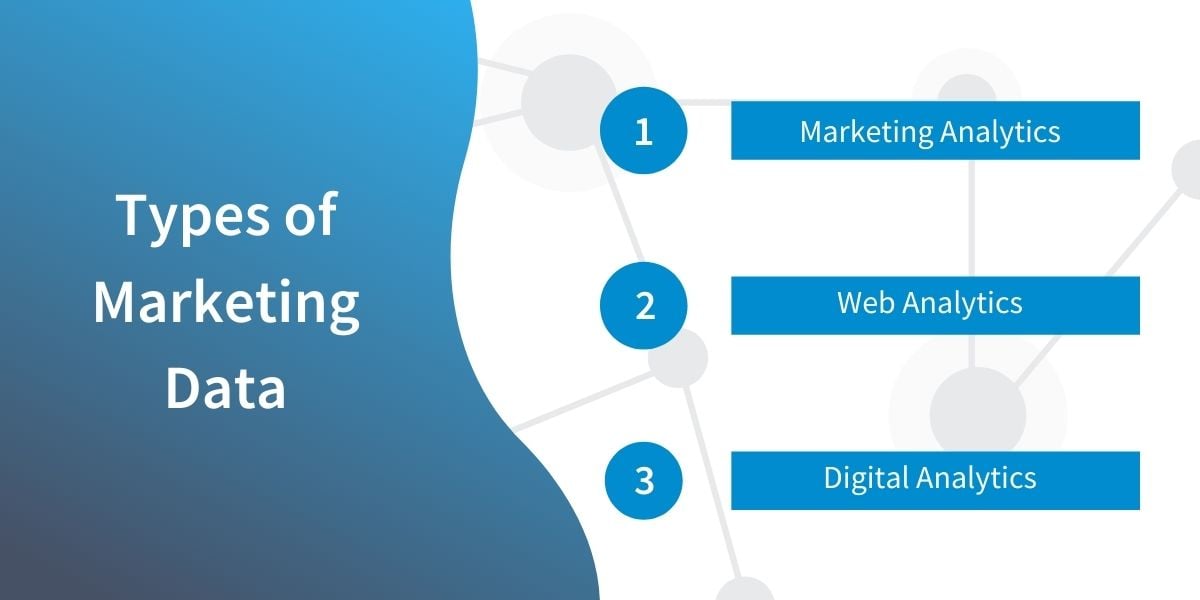
Marketing Analytics
Perhaps the broadest term in the group, marketing analytics can encompass everything from digital marketing tactics to website metrics, in-store visit information, customer records and much more. The scope of information available under the umbrella of marketing analytics is staggering, and nearly 40% of marketers are currently utilizing analytics to help them make better decisions about their campaign direction. One of the latest trends in marketing analytics is the ability to use visualizations to help speed analysis, a vital component when you do not have access to dedicated marketing analysts. Marketing analytics report on the marketing outside of your website, while web analytics may be more focused on engagement on your website alone.
Web Analytics
While technically a part of marketing analytics, web analytics is often defined as the "hard" activities on your website. Web analytics examples can include items such as the number of unique visits and pageviews on your site, the time that visitors are spending on your site as well as page load times. These analytics are considered quite an important aspect of your marketing strategy, particularly as websites tend to be one of the largest marketing investments that you make over time. On-page SEO is also an important measure that can tell you whether your content marketing is doing its job -- or not.
Digital Analytics
Again, digital analytics are often rolled up to marketing analytics, but these measures are often describing social media activity, email engagement with your audience base, the activities around SEO/SEM and search optimization. Display advertising and programmatic ads are included in digital analytics, which may also involve downloads of your mobile applications or any number of other digital engagements that wouldn't necessarily fall under the heading of your website.
As you can see, the terms are a bit slippery and tend to overlap which is why it is so incredibly vital to have a solid marketing data analyst at your side throughout your journey. This magical individual will help you interpret the activities that are causing the outcomes that you desire without letting you become overwhelmed with the thousands of available data points. Identifying the most critical measures is as much an art form as a science, and requires a deep understanding not only of data analysis, but also of business and marketing.
Best Online Marketing Analytics Courses
It's pretty obvious that you aren't going to learn everything that you need to know about web analytics metrics and marketing data simply by reading through a quick article (or via osmosis!). Fortunately, there are several free digital marketing analytics course options that will help you gain the knowledge that you need quickly and efficiently. Finding the right digital marketing course that will help you supplement your current knowledge and support the unique needs of your organization can be a challenge, however. Be sure to thoroughly research the educator and read the reviews of each course before you sign up. Even a free course is costing you time -- and you want to be sure that you're getting the best value! Here are a few options that you may want to consider:
- Udacity: Marketing Analytics and Digital Marketing
- edX: Marketing Analytics courses
- Udemy: Marketing Analytics courses
- Coursera: Marketing Analytics courses
Of course, one of the best ways to learn about marketing analytics is to view live or pre-recorded webinars from thought-leaders in the industry, such as DemandJump.
Marketing analytics help boost the performance of campaigns and ROI by carefully reviewing various metrics, defining benchmarks and utilizing that information to help build future campaigns that are more effective based on your learnings. There is a wide range of tools used to help sort through marketing analytics, including Google Analytics, business data, social media reporting tools and email activities from your marketing automation platform. With these courses, you can choose whether to dig deep into a particular platform or gain a broader perspective of the different ways that marketing analytics can impact your business. While it may take some time to become a true marketing analytics pro, focusing on a few topics at first may help you discern what types of education would be most helpful for you and your team in the future.
Marketing Performance Analysis
Now that you have a solid understanding of the available types of marketing analysis, how can you leverage this newly-discovered information? Pulling together the spectrum of data into a cohesive set of tools that can be used to drive marketing decisions is often referred to as marketing performance analysis. You are not looking at a specific aspect of the campaigns -- such as social media, website page activity, email open rates or sales. Instead, you are looking across the organization in an effort to find marketing metrics that are moving the needle and creating an enhanced performance for your business and your brand. Evaluating marketing performance often begins with benchmarking your current activity and the channels that you're utilizing and how you will be shifting your strategy in the future. Once you have fully defined your "current state" of affairs, it's much easier to start looking at where you can move the needle.
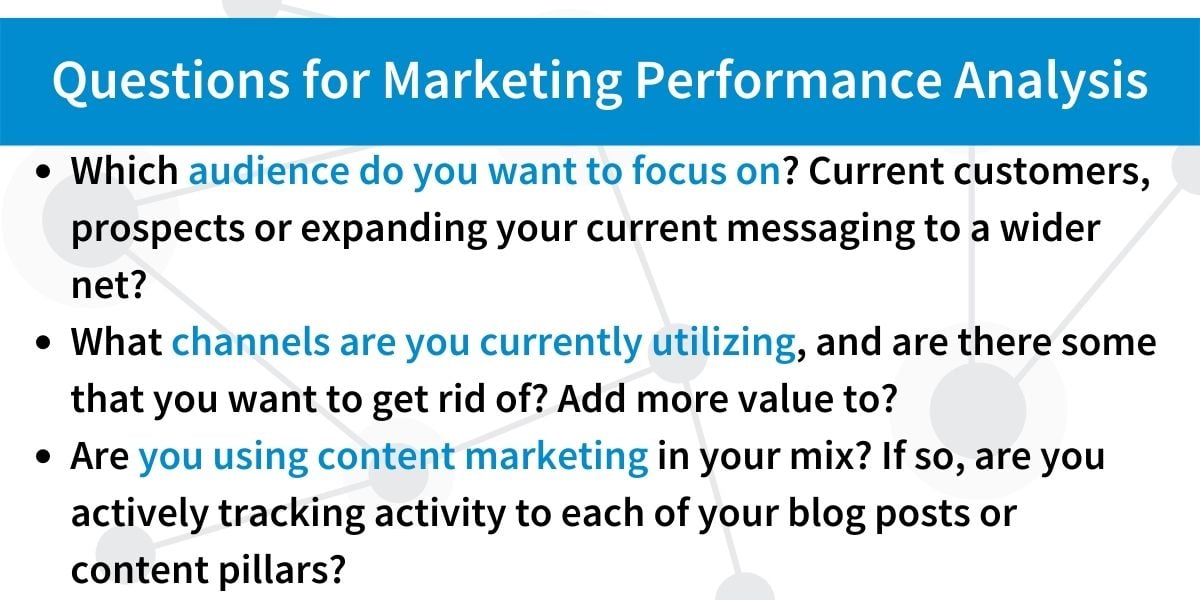
When you break down your activities into more discrete groupings, it's easier to see what type of marketing expenditures you have per channel. With that information in hand, you can begin the process involved with attributing sales and other revenue-generating activities to specific marketing tactics.
Getting the right mix of analytics for your marketing team doesn't happen overnight and is a continual process that could easily take months -- or years -- as tactics evolve and new channels for communication emerge. It can be easy to see how marketers could become overwhelmed with the flow of information, which is why it is so important to have tools that will help you bring together marketing analytics, website analytics and digital marketing analytics into a holistic view of your marketing activities. At DemandJump, we help you wade through the petabytes of information and filter down to the most important details, understanding what consumers are doing, what your competitors are doing, and ultimately what you should be doing next.. Contact us for a free demo or learn more about the importance of comprehensive analytics when you download our complimentary eBooks or view our recorded webinars.
Resources
Channel Optimization
Consumer Behavior
Consumer Insights
Consumer Insights and Analytics
Competitor Analysis Tools
Content Marketing
Content Strategy
Cross-Channel Analytics
Customer Insight Research Techniques
Customer Journey Map
Market Intelligence
Marketing Analytics Techniques
Market Research
Marketing Attribution
Opportunities of Internet Marketing
Types of Consumer Insights





